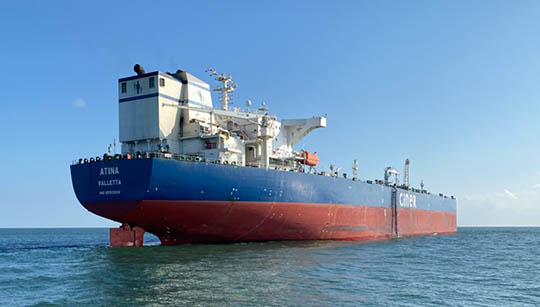
The master of a 159,500dwt tanker that struck an oil and gas platform off the US coast had not slept for more than 50 hours before the accident, an investigation has revealed.
The US National Transportation Safety Board (NTSB) has called for shipping companies to improve handover arrangements after it found that the master had immediately gone on duty after travelling from Turkey to join the ship.
The Maltese-flagged tanker Atina hit the oil and gas production platform while attempting to anchor off the coast of Louisiana in October 2020. The platform was shut down and its crew had to be evacuated, and while damage estimated at US$72.9m was caused, no pollution or injuries were reported.
The NTSB said the master had under-estimated the effects of a strong current and 25 knot winds when manoeuvring the ship, which was in ballast, at the anchorage. The master – who had been suffering from 'acute fatigue' at the time of the accident – had told crew members he wanted to anchor as soon as possible so that he could get some rest.
The master had boarded Atina as it headed downriver to the anchorage and had no handover with the departing master, whom he saw only on deck as he prepared to leave on a launch alongside.
The NTSB noted that the master had never served onboard Atina before the accident and had spent the previous 54 hours travelling from his home after being told he was 'urgently' required to replace a master who wanted to leave because of 'issues' with the SIRE vetting inspector.
'The master was placed into critical vessel evolutions – navigating downriver and anchoring at night – in a fatigued state due to the company's decision to change out vessel masters without any overlap,' the report adds.
The handover arrangements were in breach of the company's safety management system, the NTSB pointed out. This required an overlapping period of at least one day for senior officers already within the company, and at least seven days for new senior officers, and in this case would have enabled the incoming master to rest and receive handover information.
'Vessel operating companies should ensure that joining crewmembers/personnel are given the opportunity to obtain a sufficient handover period and adequate rest before taking over critical shipboard duties, such as navigation, that could impact the safety of crew, property, and the environment,' the report adds.
Investigators said voyage data recorder evidence suggested the master had initially perceived the platform to be another ship and when he questioned what it was doing the second mate gave him distances and information for an offshore supply vessel which was just under a mile beyond the platform. The NTSB found that the second officer had been looking at the S-band radar, set at a scale of 3 miles, making the platform difficult to see because it was lost in radar clutter. The master was likely looking at the X-band radar, with the scale set to 1.5 miles, making the platform easily visible at 0.5 miles.
Tags
More articles
Landmark Libra ruling finds negligent passage planning can render a ship unseaworthy
A long-awaited UK Supreme Court judgment has ruled that negligent passage planning by the master and officers can render a ship unseaworthy.
Panama Canal working conditions has 'the potential to impact international maritime trade' greater than the Ever Given grounding, warns MM&P
The International Organization of Masters, Mates & Pilots (MM&P) has released a statement warning of another supply chain crisis in the Panama Canal which has the potential to impact international maritime trade.
Government must act after Welsh university illegally employed and underpaid seafarers
A research vessel linked with Bangor University and the Welsh Government is at the centre of a pay and immigration dispute, where a contractor breached immigration and labour laws to employ seafarers in the UK illegally.
